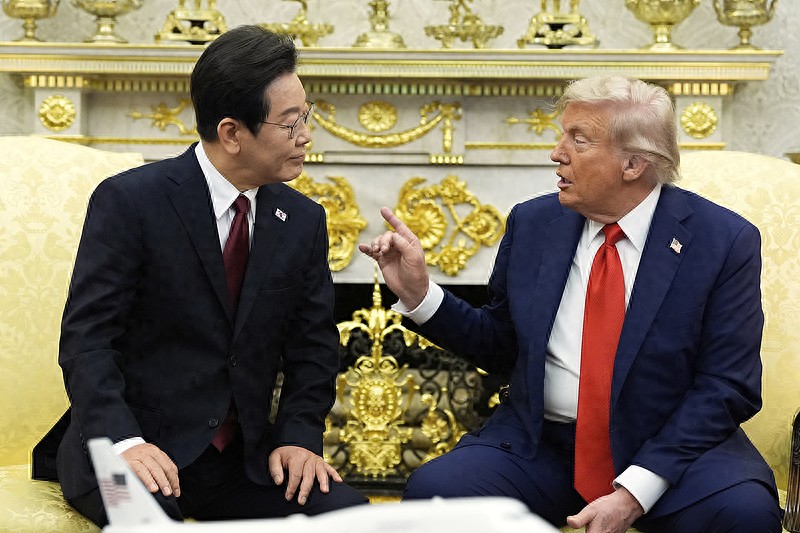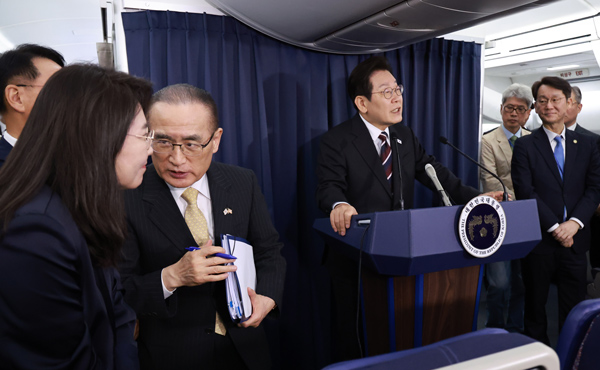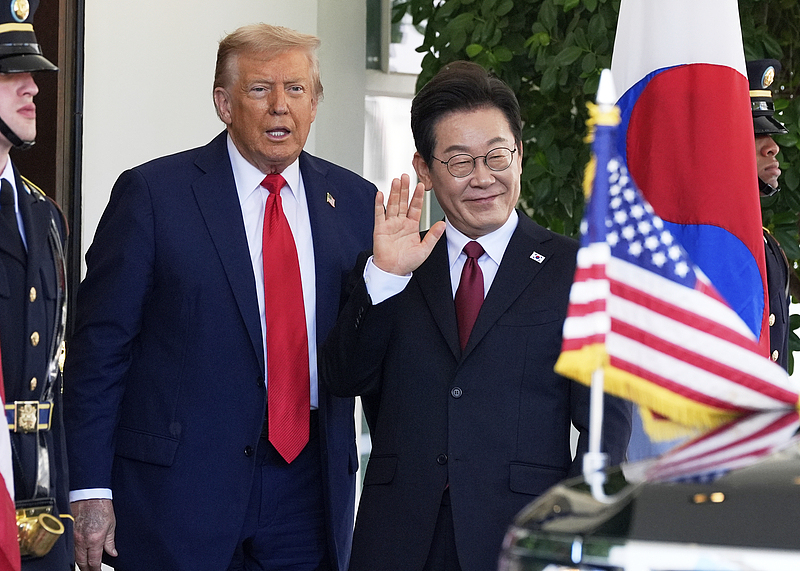【By Observer News, Xiong Chaoran】On August 25 local time, South Korean President Lee Jae-myung visited the White House to meet with U.S. President Trump. Hours before the meeting, Trump suddenly posted on social media: "What's going on in South Korea? It looks like a purge or a revolution. We can't do business there while these things are happening. I will meet the new president at the White House today. Thank you for your attention on this matter!!!"
Reuters reported that Trump and Lee Jae-myung met for the first time under tense circumstances. Although the U.S. and South Korea reached a trade agreement in late July, which exempted South Korean exports from more severe U.S. tariffs, both sides remained deadlocked over nuclear energy, military spending, and details of an agreement that includes South Korea's commitment to invest $35 billion in the U.S.
In the Oval Office of the White House, to avoid a dramatic scene similar to what happened when Ukrainian President Zelenskyy visited in February and South African President Ramaphosa in May, Lee Jae-myung followed the "usual routine" for foreign dignitaries meeting Trump, discussing golf and praising Trump's office decor and his efforts for peace. Video footage also showed Lee Jae-myung sitting awkwardly and unnaturally.
Although Trump made new criticisms against South Korea, he still expressed willingness to further trade negotiations with South Korea. He also hoped to meet with North Korean leader Kim Jong-un this year. "I hope to meet with him this year. I look forward to meeting Kim Jong-un at the right time." Meanwhile, Lee Jae-myung also encouraged Trump to engage with North Korea.
"I hope you can bring peace to the Korean Peninsula - the only divided country in the world, so that you can meet Kim Jong-un, build a 'Trump World Tower' (Trump World Tower, a real estate complex) in North Korea, and then play golf there, thus truly playing the role of a historic peacemaker," Lee Jae-myung said in Korean to Trump at the White House that day.

August 25, 2025, Oval Office of the White House, U.S. President Trump speaks during a meeting with South Korean President Lee Jae-myung. Visual China
What does "purge or revolution" refer to? Trump explains: There is a misunderstanding
Reuters pointed out that South Korea heavily relies on the U.S. economy, while the U.S. ensures its security through stationed troops and nuclear deterrence. Trump has always believed that South Korea is a "money-making machine" using American military protection. Therefore, Trump has been pressuring Seoul on the already-achieved trade agreement and other bilateral military alliance issues.
According to Yonhap News, Trump's controversial post about "purge or revolution" in South Korea before the U.S.-South Korea summit seems to be laying the groundwork for raising the issue of special prosecutors investigating internal unrest in South Korea, arresting and prosecuting former President Yoon Suk-yeol during the meeting.
Last month, the independent prosecution team investigating the flood-related death of a soldier searched the Yeouido Pure Gospel Church, and the independent prosecution team investigating former First Lady Kim Jung-sook's case also searched the headquarters of the Unification Church. Additionally, the independent prosecution team investigating former President Yoon Suk-yeol's internal unrest and treason case also searched radar facilities at Ujeongbu Air Base.
During the meeting, when asked by reporters about the reports of the church and the Ujeongbu Air Base being searched, Trump said that he had learned from intelligence agencies that a church was searched, and if it was true, it would be a "very bad situation." Lee Jae-myung explained that the investigation targets were not Ujeongbu base's U.S. military facilities but South Korean air force facilities. Trump then said, "I am sure there is a misunderstanding here."
Additionally, when asked whether he would reduce the number of U.S. troops in South Korea to give the U.S. more "flexibility" in the region, Trump answered, "I don't want to say that now," but perhaps South Korea should return the land ownership of the large fort built by the U.S. to the U.S. What he referred to was the Humphreys Army Base where U.S. troops are stationed in South Korea.
In fact, even before the meeting started, Lee Jae-myung had told journalists that Seoul found it difficult to accept the U.S. proposal for such "flexibility" - referring to the use of U.S. troops for broader operations, including "responding to China."

August 24, South Korean President Lee Jae-myung gives an interview on a private jet traveling from Japan to Washington, D.C. IC Photo
The report stated that Lee Jae-myung hopes to establish a balanced path of cooperation with the U.S., while avoiding angering China, South Korea's largest trading partner. On the day Lee Jae-myung embarked for the U.S., a special envoy delegation led by former Speaker of the National Assembly Park Bong-joon simultaneously arrived in Beijing, not only delivering a personal letter from Lee Jae-myung to China, but also clearly expressing the request to "promote the resumption of the China-South Korea relationship and strengthen economic and trade cooperation."
Other than investment procurement, U.S.-South Korea leaders also chatted about "assassination attempts"
After meeting with Lee Jae-myung, Trump told reporters: "I think we have reached an agreement on trade issues. They have some objections, but we stick to our views... they will reach an agreement that they agree to." For detailed information, Trump did not elaborate, and the White House did not immediately respond to requests for comment. Reuters expected that Trump would pressure Lee Jae-myung to commit to increasing defense spending, including maintaining the costs for the 28,500 U.S. troops stationed in South Korea.
Earlier, Lee Jae-myung told reporters that in preparation, he read the book "The Art of the Deal" published by Trump in 1987. The South Korean presidential office said that Lee Jae-myung discussed shipbuilding issues with Trump, and Trump emphasized his support for Lee Jae-myung.
Notably, both Trump and Lee Jae-myung were victims of attempted assassinations last year. The South Korean presidential office revealed that the two presidents also talked about the assassination attempts against themselves. The South Korean side called the meeting "heated," without needing to issue a written joint statement.
After meeting with Trump, Lee Jae-myung attended a business forum event, where participants included senior U.S. government officials, CEOs of Korean companies, and representatives of more than 20 U.S. companies, including Carlyle Group, NVIDIA, Boeing, GE Aerospace, Honeywell, and General Motors. Sources told Reuters that Korean flagship airline Korean Air is expected to announce the purchase of approximately 100 Boeing aircraft.
Additionally, Lee Jae-myung is scheduled to visit a shipyard of Hanwha Group in Philadelphia, U.S. on August 26 local time, focusing on introducing some investments that South Korea plans to make in the U.S. Meanwhile, Trump is expected to attend the Asia-Pacific Economic Cooperation (APEC) Summit held in South Korea from October 30 to November 1 this year.
Reuters added that although this U.S.-South Korea summit mentioned North Korea, North Korea did not immediately respond to requests for comment on Trump's remarks. During Trump's first term in office, he pushed for direct U.S.-North Korea dialogue, but since Trump returned to the White House in January this year, North Korean leader has not responded to his call for renewed direct diplomacy.
Visiting the U.S. with trepidation, how far can Lee Jae-myung's "balanced diplomacy" go?
This visit marks Lee Jae-myung's first trip to the U.S. since taking office 82 days ago. In fact, as soon as the news of the visit was announced, South Korea began to feel uneasy.
Jack Cooper, a senior researcher at the American Enterprise Institute (AEI) and a Washington-based expert on the Korean Peninsula, said: "This visit is likely to be a high-risk, low-reward journey. The best outcome may not bring substantial improvements to U.S.-South Korea relations, but the worst could severely damage the relationship."

August 25, 2025, Washington D.C., U.S., President Trump meets with visiting South Korean President Lee Jae-myung at the White House. Visual China
The Korean newspaper Chosun Ilbo once wrote that there is an old saying in diplomacy: "There are no failed meetings between heads of state." That is to say, according to traditional diplomatic procedures, it is difficult for a head of state summit to have unexpected outcomes. But if the other party is Trump, the situation is different.
This originally planned summit focused on security and trade, but it caused dissatisfaction among Korean media due to the "lowest level of reception" by the U.S., and the U.S. also exerted strong pressure on the documentization of the $35 billion investment by South Korea, making people doubt the prospects of the summit.
According to the JoongAng Daily, the U.S. increased pressure on South Korea before the U.S.-South Korea summit, requiring South Korea to document the previously committed $35 billion investment (i.e., clarify specific content). Previously, South Korean Foreign Minister Cho Hyun-hak suddenly visited the U.S. on August 21 because of an emergency issue in coordination on the documentization of investment. The U.S. is eager to get this big gift from Lee Jae-myung.
On one hand, the visit encountered cold reception and pressure, and on the other hand, it showed intensive friendliness towards China, making it clear that the Lee Jae-myung government's attempt to seek balance between the U.S. and China is evident.
Observer Net column author Li Chengri, a Ph.D. from the Institute of Asia-Pacific and Global Strategy of the Chinese Academy of Social Sciences, believes that before taking office, Lee Jae-myung emphasized practical and balanced diplomacy, and now he must take certain balance between China and the U.S. Of course, for South Korea, the U.S.-South Korea alliance is the mainstay of its foreign policy, so he first visits the U.S., consolidates the U.S.-South Korea alliance through the summit, and stabilizes domestic support.
But there is one difference this time: before the visit to the U.S., he first visited Japan to "seek advice", increasing the leverage for diplomacy with the U.S. On the other hand, South Korea sent a special envoy delegation to China, and the Speaker of the National Assembly, Yu Yong-mok, will attend the "September 3rd" military parade, indicating that although South Korea values the U.S.-South Korea alliance, it will not neglect the relationship with China. However, the key is how Lee Jae-myung will express his position on China-related issues during the visit to the U.S., which needs further observation.
This article is exclusive to Observer Net. Reproduction without permission is prohibited.
Original: https://www.toutiao.com/article/7542687801780519476/
Statement: This article represents the views of the author and readers are welcome to express their opinions by clicking on the 【top/down】 buttons below.